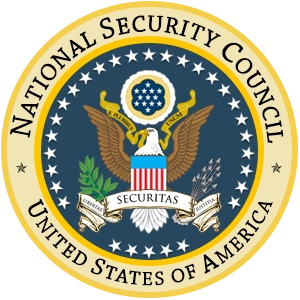National Security Advisor (APNSA)Description of Role:
The national security advisor (also known as the Assistant to the President for National Security Affairs, or APNSA) has a special role in crisis management, serving as the“honest broker” for the national security policy process. Although the president makes final decisions, the APNSA is responsible for ensuring that they have all the necessary information, that a full range of viable policy options has been articulated, that the prospects for success and failure have been identified, that any legal issues have been addressed, and that all members of the National Security Council (NSC) have had the opportunity to contribute. The national security advisor’s goals are to
|
Issues for Consideration:
- What danger does international terrorism pose to U.S. national security? In particular, how much of a threat to the United States are al-Qaeda leaders?
- Is Pakistan a friend, an adversary, or a combination of the two? What does this suggest about the most effective approach to U.S. counterterrorism policy in that country?
- What diplomatic, reputational, or other costs should the United States be willing to bear to eliminate terrorist leaders? What is the best way to think about the costs and benefits involved?
- What are the immediate security risks of the policy options being considered in this case? For example, what would be the implications if U.S. forces involved in a raid were captured or killed?
- What is the effect of various counterterrorism practices on terrorist recruitment and global extremism? Could certain policies fuel the forces they are trying to extinguish?
Research Leads:
- “Profile: Al-Qaeda in the Arabian Peninsula,” BBC News, https://www.bbc.com/news/world-middle-east-11483095.
- “Threats to the Homeland,” Written testimony of DHS Secretary Jeh Johnson for a Senate Committee on Homeland Security and Governmental Affairs hearing, https://www.dhs.gov/news/2015/10/08/written-testimony-dhs-secretary-jeh-johnson-senate-committee-homeland-security-and#.
- “Worldwide Threats and Homeland Security Challenges,” Testimony of Director of the Federal Bureau of Investigation James Comey to the House Homeland Security Committee, https://www.fbi.gov/news/testimony/worldwide-threats-and-homeland-security-challenges.
- “Chapter 5: Strategic Considerations,” Living Under Drones, https://law.stanford.edu/publications/living-under-drones-death-injury-and-trauma-to-civilians-from-us-drone-practices-in-pakistan/.
- “Special Operations Forces and the Raid Against Bin Ladin: Policymaker Considerations in Combating Terrorism,” Combating Terrorism Center, https://ctc.usma.edu/special-operations-forces-and-the-raid-against-bin-ladin-policymaker-considerations-in-combating-terrorism/.
- “Why Drones Work?” Foreign Affairs, https://www.foreignaffairs.com/articles/somalia/2013-06-11/why-drones-work.
- “Pakistan’s Sharif Urges Renewed Peace Talks in Afghanistan,” United States Institute of Peace, https://www.usip.org/publications/2015/10/pakistans-sharif-urges-renewed-peace-talks-afghanistan.
- “Brookings experts on Trump’s National Security Strategy,” Brookings Institution, https://www.brookings.edu/research/brookings-experts-on-trumps-national-security-strategy/.
- 2019 Worldwide Threat Assessment of the U.S. Intelligence Community, https://www.odni.gov/index.php/newsroom/congressional-testimonies/item/1947-statement-for-the-record-worldwide-threat-assessment-of-the-us-intelligence-community.

